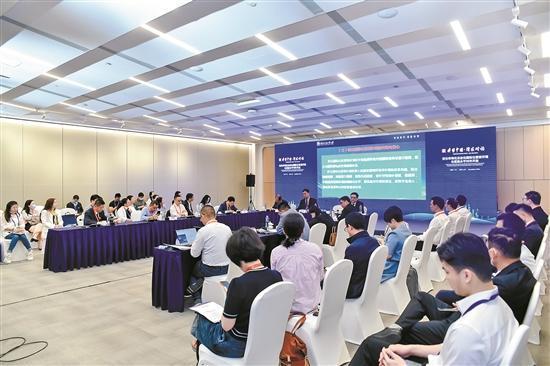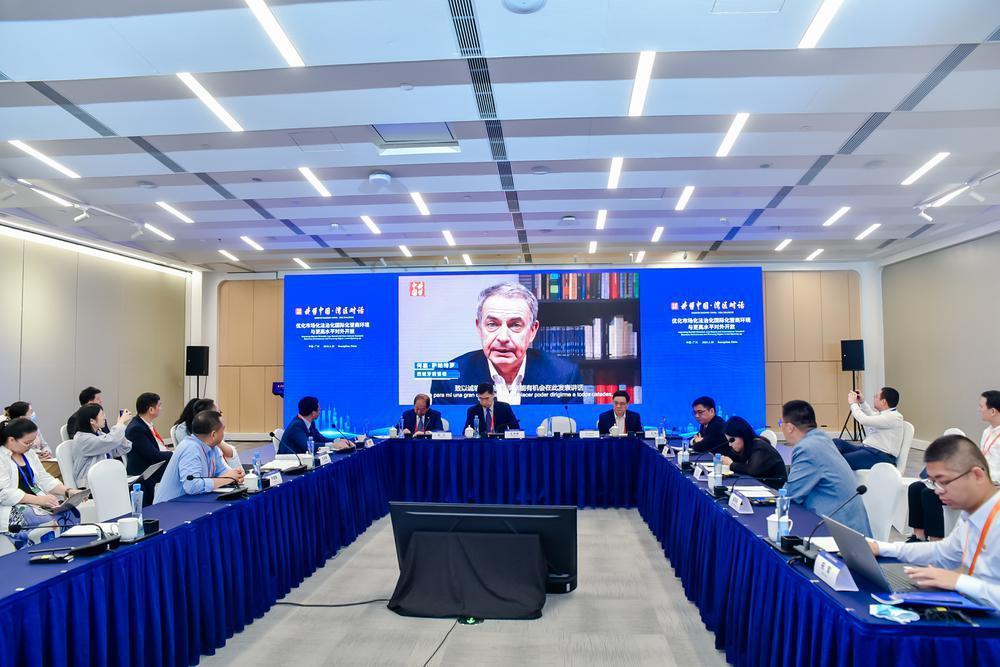We need a force to push for the improvement of global governance, and this is what we expect from China.
 |
|
China's efforts towards higher-level opening up and creating a market-oriented, rule-of-law, and international business environment were discussed at the "Understanding China - Greater Bay Area Dialogue". The event brought together Chinese and foreign entrepreneurs, policy researchers, and foreign politicians to review the significant changes brought about by China's reform and opening-up policy and the new opportunities that higher-level opening-up will bring.
A reflection of China's degree of opening-up
In recent years, China has been continuously promoting the opening up of commodities and production factors while transitioning towards institutional openness. It has been accelerating the construction of an open economic system and using opening-up to promote its own institutional and legal development, continuously building a market-oriented, rule-of-law, and international business environment.
According to data, China's actual use of foreign direct investment has increased from 113.3 billion dollars in 2012 to 189.1 billion dollars in 2022, ranking among the top in the world. In 2022, the 21 pilot free trade zones, which take lessthan 0.4% of China's land area, contributed 17.8% of the country's total imports and exports and 18.1% of the actual use of foreign capital.
How the world perceives China's opening-up
Former Bulgarian President Rosen Plevneliev expressed that today's China has deeply integrated into the world economy, and "establishing a solid and fair trade relationship with China is the top priority for advanced economies worldwide".
Former Spanish Prime Minister José Luis Rodríguez Zapatero stated that it must be acknowledged that in the past few decades, China has changed itself and the world. "In terms of technology, China currently holds the most patent applications and publications globally, as well as the most research Ph.D.s in physics and mathematics. All these achievements should to credited to the development of education, knowledge, and technology."He also mentioned that China plays an important role in the world, contributing to the establishment of a peaceful, cooperative, mutually understanding, and united community.

Manoj Joshi, a special researcher at the Observer Research Foundation in India, said that China realized opening up to the outside world through the Belt and Road Initiative, but it is also facing new challenges in the era of new globalization, such as the rise of trade protectionism.
What the world expects from China's higher-level opening-up
Plevneliev hopes that China can continue to promote multilateralism and fair trade, accelerate its modernization process, and become a green, sustainable economic entity that protects natural habitats and achieves net-zero emissions by 2050.
Zapatero stated, "We need a force to push for the improvement of global governance, and this is what we expect from China."
中国更高水平对外开放,如何惠及世界?
“读懂中国·湾区对话”专题论坛上,改革开放、更高水平的对外开放、打造市场化法治化国际化营商环境频频成为中外企业家、相关领域政策研究学者及外国政要关注的议题。与会嘉宾通过对话与研讨,回顾改革开放为中国带来巨大变革,聚焦更高水平的对外开放将带来哪些新机遇。
中国的对外开放达到什么程度?
近年来,中国在不断推动商品和要素流动型开放的同时,也向规则、规制、管理、标准等制度型开放转变,加快构建开放型经济新体制,通过开放促进自身制度建设、法治建设,不断打造市场化、法治化、国际化的营商环境。
数据显示,中国实际使用外商直接投资已由2012年的1133亿美元提升到2022年的1891亿美元,位居世界前列;
2022年,中国21个自贸试验区以占全国不到千分之四的土地贡献了全国进出口总额的17.8%,实际使用外资占全国的18.1%。
世界如何看待中国的对外开放?
在保加利亚前总统罗森·普列夫内利埃夫看来,今天的中国已深度融入世界经济。他说,“与中国建立起牢固公平的贸易关系,是全球先进经济体的首要任务”。
西班牙前首相何塞·萨帕特罗表示,必须看到,过去数十年间,中国改变了自己,与此同时也改变了世界。他说,“现在的中国在科技领域是拥有最多专利申请和最多出版物的国家,也是拥有最多物理学和数学方面科研博士的国家,其关键在于教育、知识、技术和努力。”他还提到,中国在全球的重要作用,有助于建立一个和平、合作、相互理解且团结的共同体。
印度观察家研究基金会特别研究员马诺·乔希称,我们看到中国通过“一带一路”倡议向世界开放,但也需要看到,面对新的全球化时代,中国面临着一些新的挑战,比方说国际上贸易保护主义的抬头。
期待中国更高水平的对外开放为世界带来什么?
罗森·普列夫内利埃夫在发言中提到,希望中国继续推动多边主义和公平贸易,继续加速现代化进程;更坚定地打造成一个绿色可持续的经济体,保护自然栖息地,推进脱碳进程,直至2050年达到净零排放的标准。
何塞·萨帕特罗说:“我们需要能够推动完善全球治理的力量,这就是我们对中国的期望。”
文|羊城晚报全媒体记者 谭铮
图片|羊城晚报全媒体记者 宋金峪 周巍
翻译|刘佳慧
责编|王瑜瑛









